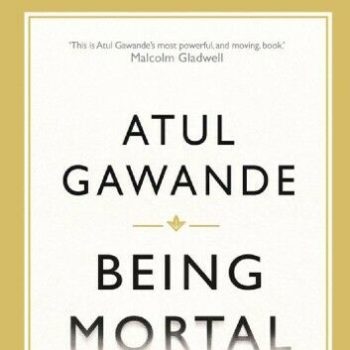Book Review: Being Mortal – Medicine and What Matters in the End
“Being Mortal,” published in 2014, explores in graceful detail the often-taboo topic of death and dying from the perspective of a modern medical practitioner. The author, Dr. Gawande, approaches this non-fiction writing in the same way as one would approach a story, illustrating each point with personal anecdotes from his viewpoint as a general surgeon and a son.
Although the core of the book is an exploration of medical care for the terminally ill and understanding the limits of such care, Gawande also provides a look into the evolution of elder care and the treatment of death and dying throughout history. At times critical of the medical system, Gawande settles on a balanced perspective that can be helpful when framing our own discussions about the level of care we desire.
The author stresses modern medicine’s limits in curing many of the illnesses associated with aging and urges readers to focus on the quality of their life rather than their medical ailment. As Gawande points out, there is rarely a time where a doctor truly has nothing else he or she can do to treat a patient. A new therapy option, a new medication, a new procedure, or a new treatment is usually available and could be used to prolong life. The central question, and the core challenge of this book, is discerning when and under what circumstances the next treatment or procedure should be implemented, and how to make that decision a personal and premeditated one.
“Being Mortal” is written in two distinct parts. The first five chapters of the book explore the impact of aging and maintaining one’s independence. Gawande writes, “Our reverence for independence takes no account of the reality of what happens in life: sooner or later, independence will become impossible.”
Because medicine has been slow to address the need for geriatric care, the author notes that families tend to bear the overwhelming weight of end-of-life decisions themselves, outside the influence and support of the medical community. Gawande explores the history of institutional caring for the elderly and incapacitated, from the poor house to modern-day assisted living and continuum of care facilities. At each step, he uses personal stories to bring the concepts to life and meaning.
As his message develops, it becomes clear that Gawande believes families’ focus should be primarily on the quality of a life, and secondarily on the various medical care and safety options available from a traditional nursing home setting. Echoing this message, Gawande quotes a central theme in modern elder care: “To help people in a state of dependence sustain the value of existence.”
The second half of Being Mortal changes tone to become an exploration of medical care for the terminally ill. These concluding chapters can be succinctly summarized in Gawande’s own words: “When should we try to fix and when should we not?”
There are few limits on the ability of doctors to act and continue treating a disease, but Gawande questions if this should be the desired goal. “As people become aware of the finitude of their life, they do not ask for much. They do not seek more riches. They do not seek more power. They ask only to be permitted, insofar as possible, to keep shaping the story of their life in the world – to make choices and sustain connections to others according to their own priorities.”
In the remaining chapters of the book, Dr. Gawande explores real cases of patients, including his own father’s terminal cancer diagnosis, to discuss the central question of how far medical intervention should be taken. He explores the fields of palliative care and the benefits of hospice as end-of-life-option. Gawande urges readers to have hard conversations about the extent and type of care they or their loved ones want when faced with a serious or terminal diagnosis. Discussing these desires in advance and having the tough conversations is, in Gawande’s eyes, of immeasurable benefit to the entire family.
Dr. Gawande has been featured on PBS’s Frontline series in a discussion of the cases of several patients featured in his book. To watch the full hour feature presentation, follow the web link below:
http://www.pbs.org/wgbh/frontline/film/being-mortal/
In closing, as your financial advisors, we believe in planning for all aspects of life. While retirement planning, college funding, charitable giving, and tax planning may seem to be the obvious areas to leverage our expertise, we are also well equipped to guide your choices in elder care planning.
As a resource, “Being Mortal” is a valuable read, as it explores many of the concrete issues you will be faced with when making the appropriate choices in your plans.
SYM also offers clients a software tool to help in the organization and codification of end-of-life wishes and share them with family and close friends. The program, Everplans, is a web-based portal for personal data, medical history, considerations for living arrangements as your independence begins to decline, and end of life wishes. The service is provided by SYM, but the information can be as shared or as confidential as you see fit.
We encourage you to reach out to your advisor to discuss the next step in elder care planning for your family.



